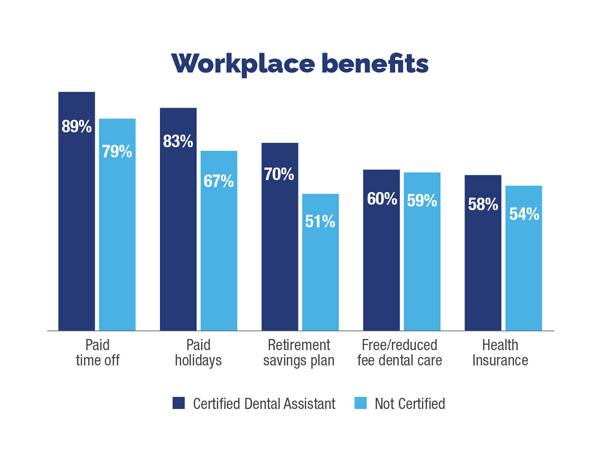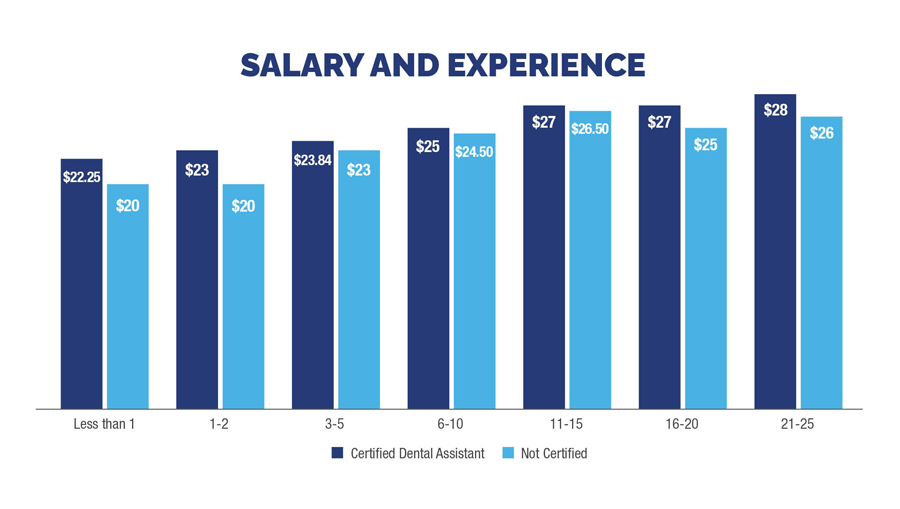The comprehensive guide to growing your dental assistant salary

Salary is a hot topic for dental assistants, both for those who are new to the profession and those who have many years of experience. And the truth is dental assisting salaries have a wide range across the U.S. Your earning potential as a dental assistant is influenced by many factors, including your credentials, where you live, how much experience you have, and what kind of practice you work in.
Of course, everyone wants to know how to make more money. According to DANB’s 2024 Dental Assistants Salary and Satisfaction Survey, dental assistants who earn more money have higher job satisfaction. If you’re looking to earn more as a dental assistant, check out the tips below.
1. Consider your job location
Where you live can significantly influence how much you earn. According to DANB’s salary survey, the median hourly wage for Certified Dental Assistants (CDAs) is anywhere from $17.50 to $38.00. For non-certificants, the pay rate ranges from $17.37 to $30.23 per hour. The Bureau of Labor Statistics also has salary data for all dental assistants across the country. Click here to see which states pay dental assistants the most.
Beyond what state you live in, whether you live in a small or large town can make a difference in your hourly wage. According to DANB’s survey, dental assistants working in a large urban area (population of 50,000 or more) earn the most. CDAs in these areas earn $28.00 per hour, while non-CDAs earn $22.90. In rural areas (population less than 2,500), CDAs make $25.50 per hour and non-CDAs earn $22.00. Of course, the cost of living may be higher in more urban areas, so if you’re considering a move, it’s worth taking a closer look to determine what’s best for you.
2. Earn certification
Becoming DANB-certified is one way to grow your salary. DANB’s salary survey found that CDAs earn 15% more than those who are not certified. Being certified can provide new career opportunities. CDAs are more likely than non-CDAs to perform restorative functions, be lead dental assistants, become office managers, and work as educators. All of these opportunities can potentially boost your income. Here are the median hourly wages for CDAs who serve in each position:
- Restorative functions: $27.00 per hour
- Lead dental assistant: $27.25 per hour
- Office manager/practice administrator: $31.25 per hour
- Educator: $35.00 per hour
Additionally, the survey shows that CDAs also reported receiving more workplace benefits — such as paid time off, paid holidays, retirement savings plans, free and reduced-fee dental care, and health insurance — compared with those who are not certified.
3. Take on more responsibilities
Dental assistants with more experience and credentials tend to earn more per hour than those who are new to the field.
 They’re also more likely to perform expanded functions. Allowable expanded functions and dental assisting job titles vary by state, but some examples of expanded functions credentials that you might be able to earn are EFDA, RDAEF or EDDA, to name a few. If you’d like to grow your salary by performing expanded functions, the first step is to brush up on the requirements in your state.
They’re also more likely to perform expanded functions. Allowable expanded functions and dental assisting job titles vary by state, but some examples of expanded functions credentials that you might be able to earn are EFDA, RDAEF or EDDA, to name a few. If you’d like to grow your salary by performing expanded functions, the first step is to brush up on the requirements in your state.
4. Find your specialty
Although general dental practices are the most common, consider exploring other types of practices. You may find that learning additional skills can lead to an increase in compensation. For example, looking for a position at a specialty practice may be a good move. DANB’s salary survey shows that CDA certificants who work in periodontics, oral surgery, orthodontics, and prosthodontics have the highest wages.
5. Do your research
Research shows that those who ask for raises are more likely to receive them. But before you do this, it’s important to do your homework so you’ll be prepared for this conversation with your employer. First, outline all the ways you’ve contributed to the dental practice in the past year. You’ll also want to look up the average wages for dental assistants in your area, keeping your credentials in mind. Once you’ve gathered your information, review the steps to asking for a raise and the best ways to approach the conversation with your employer.
Read more:

